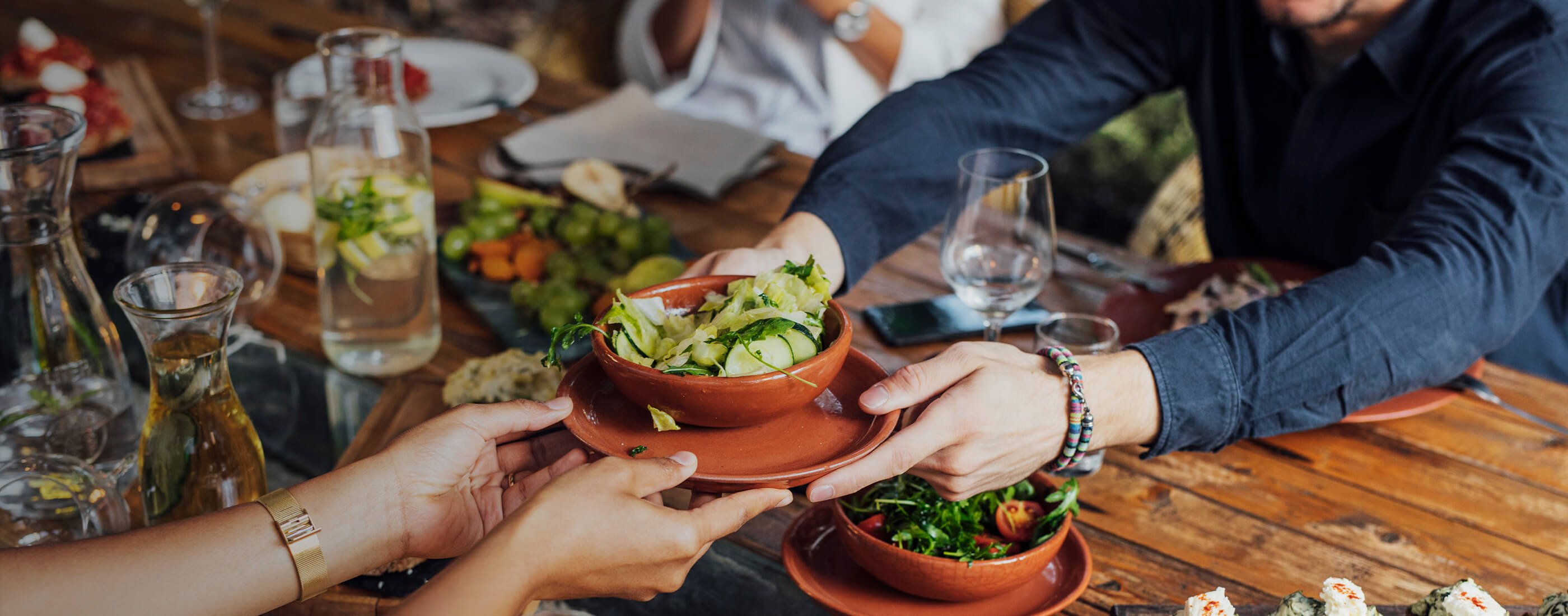
Ocean Friendly Restaurants
About The Program
The Surfrider Foundation’s Ocean Friendly Restaurants program empowers restaurants to eliminate wasteful single-use plastics through a straightforward framework for sustainable practices. This inclusive community of eco-conscious restaurants, activists, and patrons promotes healthier lifestyles, supports plastic-free solutions, and inspires broader action to protect our ocean and planet.
Learn how to get involved and help make dining Ocean Friendly.
Read the criteria, FAQ, and sign up your restaurant.
Stop Pollution At The Source
Plastic is a problem before it reaches the beach. Extraction, production, consumption, and disposal carry serious environmental and humanitarian consequences. Single-use plastic is particularly detrimental as bags, bottles, straws, expanded polystyrene foam, and food wrappers consistently top the list of items our volunteers collect at cleanups. Researchers estimate up to 11 million metric tons of plastic waste enter the ocean annually, and by 2025, 11 billion metric tons will have accumulated in the environment.* This pollution impacts our marine ecosystems and wildlife, including seabirds, dolphins, fish, turtles, and whales. Plastic fragments are even displacing plankton as the base of the food chain. It's not just ocean life at stake - plastic contains toxic chemicals that can transfer from containers, cups, cutlery, and straws directly into the food we eat. Not to mention the hundreds of thousands of microplastics we're exposed to daily through our food, water, and air.* *Sources can be found on Beachapedia
While the problem may be complex, the solution is simple - we must stop plastic at the source!
The Surfrider Foundation's Ocean Friendly Restaurants program does just that. We recognize restaurants committed to cutting out wasteful single-use plastic and offer a straightforward framework to help them make sustainable choices for our ocean. The result is a community of like-minded restaurants we can promote, support, and lift up as examples of success in influencing plastic reduction legislation. The larger our network of Ocean Friendly leaders grows, the more mainstream the concept of plastic-free becomes.
Find an Ocean Friendly Restaurant Near You
{{ errorMessage }}
menu Menu
{{ city }}
- {{ ofr.ocean_friendly_business_name }} {{ ofr.ocean_friendly_business_name }}
The Ocean Friendly Restaurants program recognizes restaurants that are committed to making sustainable choices for our ocean so that people can dine with peace of mind.
How To Participate
Mandatory Criteria (All 7 Required):
- Only reusable foodware is used for onsite dining.*
- Paper straws are provided only upon request.**
- No expanded polystyrene use (aka Styrofoam).
- No plastic bags are used for takeout or to-go orders.
- Single-use utensils, straws, condiments, and other accessory items are provided only upon request.
- Beverages are not sold in plastic bottles.
- Proper recycling practices are followed.
* Foodware includes dinnerware, drinkware, silverware, and ramekins/containers.
** Exceptions may be made for naturally occurring materials (e.g. hay, bamboo) and reusables (e.g. metal, glass), not including bio-based plastic. Straws should be provided to anyone who needs one, including people with disabilities. Read more here.
Check out our Quick Guide for more tips to meet each of the criteria.
Review our Ocean Friendly Foodware Guide 2.0 to learn about greenwashing, product alternatives, and creative ways to implement more reusables.
Optional Criteria (Choose At Least 3):
- A discount is offered for customers with a reusable item (e.g. cup, container, bag).
- Vegetarian and vegan food options are offered on a regular basis.
- All seafood is ‘Best Choice’ or ‘Good Alternative’ as defined by Seafood Watch, or no seafood is served.*
- Water conservation and pollution mitigation efforts are implemented.**
- Energy efficiency efforts are in place.***
- Concessions and pre-packaged food items are not sold in plastic packaging.
- Composting efforts are in place for food waste.
- Neither single-use plastic nor bio-based plastic containers are used for takeout or to-go orders, reusable containers are preferred.
* Locally sourced, sustainable seafood is preferred and should be prioritized when Seafood Watch recommendations do not apply.
** Examples include installing low-flow faucets and toilets, offering drinking water upon request only, no hosing down outside to reduce urban runoff, proper disposal of FOG, and up-to-date septic or sewage to prevent wastewater pollution.
*** Examples include switching to LED lighting, installing solar panels, using Energy Star certified appliances and/or other efforts to use less energy






